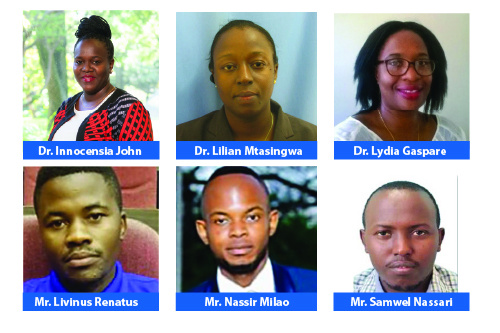Revolutionising Food Chains: UDSM Scholars collaborate with MSU and Nigeria in crucial Africa Food Access Initiative
By Jackson Isdory, CMU
In a remarkable stride towards addressing food security challenges in Africa, scholars from the University of Dar es Salaam (UDSM) in collaboration with Michigan State University (MSU) and other partners from Tanzania and Nigeria have embarked on a transformative food access initiative.
This groundbreaking research project aims to revolutionise food value chains and strengthen micro, small, and medium enterprises (MSMEs) in Nigeria and Tanzania. Titled "Research Supporting African SMEs to Provide Safe and Nutritious Food (MSU RSM2SNF)", the project has received generous funding from the Bill & Melinda Gates Foundation and is set to span five years, from 2022 to 2026.
“The purpose of the project is to bridge gaps in the availability of safe and nutritious food for low-income population, in the five years (2022–2026)”, stated the project information posted on the MSU website.
In the effort to attain its vision specifically engaging into problem solving research, the University of Dar es Salaam scholars have won a chance to participate in this collaboration to spearhead the revolutionising food value chains and support micro, small, and medium enterprises (MSMEs) in Nigeria and Tanzania.
The project, led by the Principal Investigator, Prof. Saweda Liverpool-Tassie intends to empower MSMEs in Nigeria and Tanzania to provide safe and nutritious food at affordable prices, particularly targeting vulnerable populations. Driven by a broader vision, the project aims to equip governmental bodies, development partners, and policymakers with the knowledge and resources needed to facilitate the growth of these critical enterprises.
Additionally, UDSM researchers who will be involved in the project will be empowered to conduct impactful studies and share insights that shape policy decisions pertaining to the various stages of food value chains.
Project leadership and team composition
Under the expert guidance of renowned Principal Investigator Prof. Saweda Liverpool-Tasie, Michigan State University is collaborating with academic and research institutions in Nigeria and Tanzania to comprehensively study and enhance different facets of food value chains.
“The project researches into the details of wholesale, logistics, processing, and retail, with a particular focus on essential products like fish and tomatoes”, elaborated the project statement.
Project team members from UDSM
The significance of this collaboration is underscored by the involvement of an impressive team of UDSM scholars including Dr. Lydia Gaspare, a lecturer at the University of Dar es Salaam, School of Aquatic Sciences and Fisheries Technology (SoAF), who brings over a decade of expertise as the Fish Lead within the project. Her insights into marine fisheries and socio-ecological systems are invaluable.
Other UDSM members of staff in the project include Dr. Innocensia John, an economist hailing from the University of Dar es Salaam School of Economics (UDSE), plays a pivotal role as the Tanzania Economics Lead, leveraging her extensive experience to drive positive change.
In addition, Dr. Lilian V. Mtasingwa, a UDSM lecturer in Development Studies with a specialisation in Gender and Development, assumes the role of Gender Lead for the Tanzania team. Her expertise will contribute to the project's comprehensive approach to fostering inclusivity and equitable progress.
Commenting on the project, Dr. Mtasingwa said: “this initiative is a game-changer, as it addresses both economic development and nutrition simultaneously. Incorporating gender perspectives in this project is a significant step towards promoting equity and inclusivity in the food value chain".
Early Career Scholars
In a move highlighting the commitment to nurturing emerging talent and knowledge sharing, the project also includes early career scholars. Students from the University of Dar es Salaam, namely Mr. Nassir Milao, Mr. Samwel Nassari, and Mr. Livinus Renatus, have become integral members of the project team.
These young students’ fresh perspectives and enthusiasm bring a new dimension to the effort, and, as one DARUSO leader noted: "Engaging young scholars in such initiatives ensures a sustainable and dynamic future for Africa's food systems."
Support and recognition
The project has garnered support from UDSM's leadership, including UDSM Deputy Vice Chancellor-Research Prof. Nelson Boniface, who expressed optimism about its success and its potential impact on institutional advancement and Tanzania's overall development.
“This cutting-edge research project has the potential to drive tangible development outcomes, and I encourage ethical and professional conduct throughout", said Prof. Boniface.
Meanwhile, UDSM Head of Communication and Marketing, Dr. Dotto Paul Kuhenga, commended the project team members for their proactive approach in applying for the positions in the project and emphasised the value of visiting regularly the university's website for future opportunities.
“This collaboration is a testament to the proactive spirit and dedication of UDSM's academic community. Projects like these exemplify the power of research and collaboration to address critical global challenges, such as food security and nutrition”, said Dr. Kuhenga.
Powered by collaboration, research, and innovation, this pioneering effort, has the potential to revolutionise food systems, empower enterprises, and drive positive change in the landscape of nutrition and affordability in Africa. With a comprehensive approach and a diverse team of experts, the MSU RSM2SNF project is poised to make a lasting impact on food security and economic development across the continent.
Other News
Wed, 08.Jan.2025 : President Mwinyi proclaims UDSM-IMS role in Blue Economy policySun, 05.Jan.2025 : Ministry of Blue Economy, UDSM in key conversations ahead of historic Foundation Stone laying at IMS
Fri, 20.Dec.2024 : ALAF Limited yatoa ufadhili wa masomo ya Umahiri katika Kiswahili kwa wanafunzi wa UDSM
Thu, 19.Dec.2024 : UDSM Herbarium: an invaluable resource fostering conservation, plant taxonomy and ecology
Sat, 14.Dec.2024 : Tracer study findings stress on curriculum to meet national human resource needs
Sat, 14.Dec.2024 : Prof. Mushi calls for ethical and inclusive innovation as Africa higher education leverages AI
Fri, 13.Dec.2024 : UDSM kuwa kituo cha utafiti wa Sayansi ya Bahari barani Afrika
Fri, 13.Dec.2024 : Multi-billion Sida funds to boost research on sustainable development at UDSM


